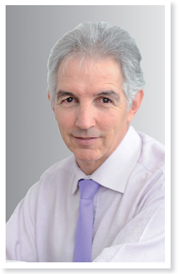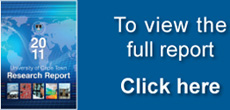Message from the
Vice-Chancellor
 The roles of a university are complex. In addition to providing an excellent education for our students and building a highly-skilled workforce that is mindful of the responsibilities of democratic citizenship, we need to push the boundaries of knowledge and challenge the status quo at every turn. We do so in order to contribute to the development and transformation of our society and the betterment of the world in which we live. I believe that UCT delivers to these goals at an exceptional level.
The roles of a university are complex. In addition to providing an excellent education for our students and building a highly-skilled workforce that is mindful of the responsibilities of democratic citizenship, we need to push the boundaries of knowledge and challenge the status quo at every turn. We do so in order to contribute to the development and transformation of our society and the betterment of the world in which we live. I believe that UCT delivers to these goals at an exceptional level.
We measure the quality and impact of our research in a variety of ways, but one of the indicators is our strong performance in the three main global university ranking systems. Two out of the three of these rely to a significant extent on different indicators of research impact. In 2010 and 2011, UCT retained its position between 100 and 110, on the Times Higher Education (THE) World University Rankings, and around 160 in the Quacquarelli Symonds (QS) World University Rankings for 2011/12. The THE and QS systems continue to rank UCT as the only university in Africa in the top 200. UCT was also the only university in Africa to make the top 300 range of the Shanghai Jiao Tong Academic Ranking of World Universities (ARWU).
This strong showing is due to both the quality of the research and the fact that our researchers are open to the world and co-operate with partners on every continent. UCT’s membership of the Worldwide Universities Network is our current general initiative to encourage meaningful international co-operation – and the indications are that this is paying off.
The university is deeply conscious of its obligation to make its resources, including its research resources, available as widely as possible to the community in which it lives. To this end, the Knowledge Co-op was launched last year. This is a shared venture of the deputy vicechancellors who are responsible for social responsiveness and research. It offers community organisations that would not normally have access to the university’s research capability the opportunity to bring problems that could be tackled as part of student projects, typically at honours or master’s level. Several projects have already been successfully completed.
The research achievements at UCT in the past year are too numerous to list here. It is, however, appropriate to mention just a few important highlights:
Finally, we remain grateful to our donors, sponsors and investors, who generously contribute to our research effort, and to our national and international collaborators who partner with UCT to conduct world-class research. We value these partnerships and look forward to another successful year.
Vice-Chancellor

We measure the quality and impact of our research in a variety of ways, but one of the indicators is our strong performance in the three main global university ranking systems. Two out of the three of these rely to a significant extent on different indicators of research impact. In 2010 and 2011, UCT retained its position between 100 and 110, on the Times Higher Education (THE) World University Rankings, and around 160 in the Quacquarelli Symonds (QS) World University Rankings for 2011/12. The THE and QS systems continue to rank UCT as the only university in Africa in the top 200. UCT was also the only university in Africa to make the top 300 range of the Shanghai Jiao Tong Academic Ranking of World Universities (ARWU).
This strong showing is due to both the quality of the research and the fact that our researchers are open to the world and co-operate with partners on every continent. UCT’s membership of the Worldwide Universities Network is our current general initiative to encourage meaningful international co-operation – and the indications are that this is paying off.
The university is deeply conscious of its obligation to make its resources, including its research resources, available as widely as possible to the community in which it lives. To this end, the Knowledge Co-op was launched last year. This is a shared venture of the deputy vicechancellors who are responsible for social responsiveness and research. It offers community organisations that would not normally have access to the university’s research capability the opportunity to bring problems that could be tackled as part of student projects, typically at honours or master’s level. Several projects have already been successfully completed.
The research achievements at UCT in the past year are too numerous to list here. It is, however, appropriate to mention just a few important highlights:
- In regard to the first of the national priorities ident i f ied in our strategic goals, the Pro Vice-Chancellor and Director of the African Climate and Development Initiative, Professor Mark New, took up his post in July 2011 and made a strong start in fulfilling the objectives of this key research area (which was also officially recognised by the University Research Committee as the sixth Signature Theme).
- The second such national priority area, the Safety and Violence Initiative (SaVI), under the leadership of Dr Catherine Ward, holds an equally strong research agenda and hosted its first conference in September 2011, under the title Promoting safety, Reducing violence, Raising awareness, with experts from all over the world, including Jamaica, Scotland, and Switzerland.
- Strong efforts were also made to support South Africa’s bid for the Square Kilometre Array (SKA) telescope (that would prove to be successful at the beginning of 2012), such as targeted financial support to the efforts of the Department of Astronomy.
- Through the Institute of Infectious Disease and Molecular Medicine, we continue to make significant strides in addressing the fight against infectious diseases.
- Professor Jill Farrant was selected as one of five exceptional women scientists from around the world to receive the L’Oréal-UNESCO Awards in Life Sciences.
- Professors Ed Rybicki and Heather Zar were awarded A-ratings by the National Research Foundation (NRF), thereby affirming their status as world leaders in their respective fields. They were joined by professors George Ekama and Hans-Peter Kunzi who retained their A-ratings on re-application.
- Dr David Braun, Dr Shadreck Chirikure, and Dr Amanda Weltman were awarded NR F President’s Awards (P-ratings) on the basis of exceptional work conducted during their doctoral and postdoctoral studies.
Finally, we remain grateful to our donors, sponsors and investors, who generously contribute to our research effort, and to our national and international collaborators who partner with UCT to conduct world-class research. We value these partnerships and look forward to another successful year.


